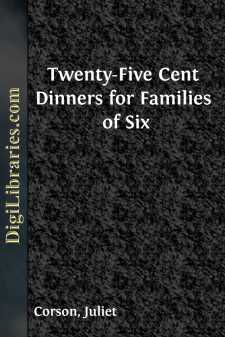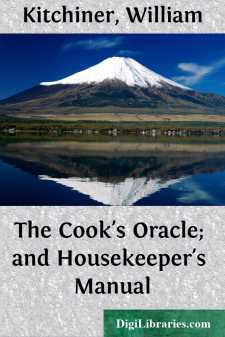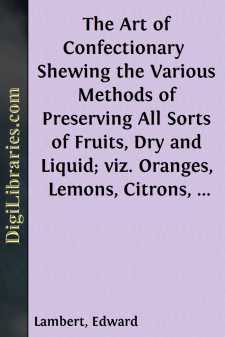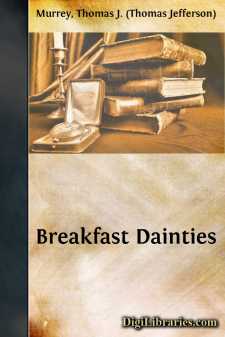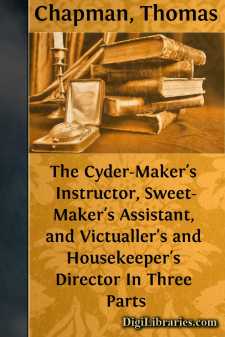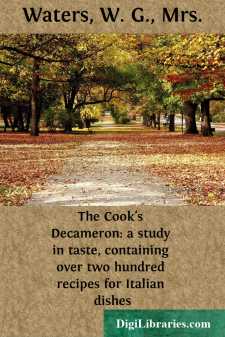Cooking
- General 70
- History 1
- Reference 10
- Regional & Ethnic 3
- Vegetarian 10
Cooking Books
Sort by:
by:
Juliet Corson
The wide publicity which the press in different sections of the country has given to my offer to show workingpeople earning a dollar and a half, or less, per day, how to get a good dinner for fifteen cents, has brought me a great many letters from those who earn more, and can consequently afford a more extended diet. In response to their requirements I have written this book, which I hope will be found...
more...
SALADS AND SANDWICHES SALADS IN THE DIET 1. So much variety exists among salads that it is somewhat difficult to give a comprehensive definition of this class of foods. In general, however, salads may be considered as a dish of green herbs or vegetables, sometimes cooked, and usually chopped or sliced, sometimes mixed with fruit or with cooked and chopped cold meat, fish, etc., and generally served...
more...
PREFACE. Among the multitudes of causes which concur to impair health and produce disease, the most general is the improper quality of our food: this most frequently arises from the injudicious manner in which it is prepared: yet strange, “passing strange,” this is the only one for which a remedy has not been sought; few persons bestow half so much attention on the preservation of their own health,...
more...
INTRODUCTION. Since the issue of my "Studies and Illustrations of Mushrooms," as Bulletins 138 and 168 of the Cornell University Agricultural Experiment Station, there have been so many inquiries for them and for literature dealing with a larger number of species, it seemed desirable to publish in book form a selection from the number of illustrations of these plants which I have accumulated...
more...
by:
Edward Lambert
Of the Manner of clarifying Sugar, and the different Ways of boiling it. Since the Ground-work of the Confectioner's Art depends on the Knowledge of clarifying and boiling Sugars, I shall here distinctly set them down, that the several Terms hereafter mentioned may the more easily be understood; which, when thoroughly comprehended, will prevent the unnecessary Repetitions of them, which would...
more...
REMARKS ON BREAKFAST COOKERY. "Dinner may be pleasant, So may social tea;But yet methinks the breakfast Is best of all the three." The importance of preparing a variety of dainty dishes for the breakfast table is but lightly considered by many who can afford luxuries, quite as much as by those who little dream of the delightful, palate-pleasing compounds made from "unconsidered...
more...
INTRODUCTION This book is written with the object of laying before the public a cookery book which will be useful not only to vegetarians, but also to flesh eaters, who are often at a loss for recipes for non-flesh dishes. Nowadays most people admit that "too much meat is eaten"; but when the housewife tries to put before her family or friends a meal in which meat is to be conspicuous by its...
more...
CHAPTER I INTRODUCTIONUntila comparatively recent period, education was regarded mainly as a means of training the intellect, but this conception of education is now considered incomplete and inadequate. Our ideas of the purpose of schools are becoming broader, and we have decided that not only the mental nature, but all the child's activities and interests, should be given direction by means of...
more...
by:
Thomas Chapman
PREFACE The following Receipts and Directions are not collected from books, nor interspersed with old women's nostrums; but they are, in very truth, the result of my own LONG EXPERIENCE in trade, founded on chemical principles, which are principles of never-erring nature. Perhaps I had never thought of this Method of communicating my little knowledge, had it not been for many gentlemen in the...
more...
by:
W. G. Waters
Preface Montaigne in one of his essays* mentions the high excellence Italian cookery had attained in his day. "I have entered into this Discourse upon the Occasion of an Italian I lately receiv'd into my Service, and who was Clerk of the Kitchen to the late Cardinal Caraffa till his Death. I put this Fellow upon an Account of his office: Where he fell to Discourse of this Palate-Science, with...
more...


